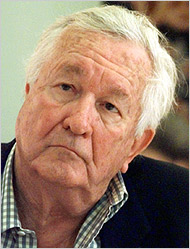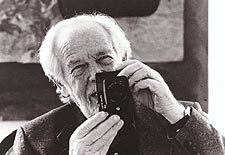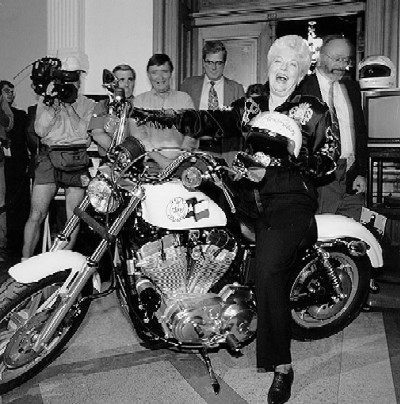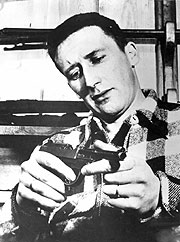BBC: “Joseph Barbera, one half of the team behind such cartoon classics as The Flintstones, Yogi Bear, Scooby-Doo and Huckleberry Hound, has died, aged 95.”
Category / Obits
RIP Dave Cockrum
Sad news from Peter David. Comic books legend Dave Cockrum has passed away. More info on Cockrum’s contributions can be found here.
Altman Dead
Robert Altman is dead I’m stunned. Shocked. Altman was one of the greats. And I’ll have more to say later.
On Milton Friedman’s Passing
It’s rather fitting that economist Milton Friedman died today of heart failure. The man didn’t have much of a heart to begin with, unless you count an almost total concern with keeping money in the hands of the rich as a bona-fide conviction.
Friedman was quite adamant on this point, so staunch that he insisted that the government should keep its hands out of private industry. Wage control? Price control? Not for Friedman. The economy was a buckling bronco that could stay in its own turf without so much as a guardrail, thank you very much. It wasn’t a surprise when he fawned over the Gipper (one of his many employers) when the Grand Old Man kicked the bucket, writing:
To Reagan, of course, holding down government spending was a means to an end, not an end in itself. That end was freedom, human freedom, the right of every individual to pursue his own objectives and values so long as he does not interfere with the corresponding right of others.
For a guy who railed against the evils of socialism (even referring to Nixon’s 1971 90 day wage and price freeze as “socialist“), this libertarian notion seems just as naive in its inability to account for the devilish impulses of human nature. What was human freedom for Friedman? In a lecture Friedman delivered in 1991, he compared human freedom’s essence to that of a free private market, calling it “the freedom of people to make their own decisions so long as they do not prevent anybody else from doing the same thing.” This would all be very nice if we assume that human freedom is always benevolent. But who sets the standard for these freedoms? What one person may consider non-preventive freedom is likely to be very harmful to another. Particularly when we consider export processing zones, sweatshops, Wal-Mart overtime, and our current unchecked spending spree in Iraq. Of course, if you subscribe to the Friedman philosophy, I suppose you can look the other way. I suppose you can look to the Jack Welches of the world as great captains of industry who fulfill their own objectives and values. Perhaps 100,000 layoffs in four years, the economic equivalent of the Great Purges, doesn’t interfere with another businessman’s “objectives and values.” But it certainly harms a lot of individuals and families in the name of profit. The Friedmanite will argue that the worker deliberately entered into an arrangement with his employer and should have seen what was coming. But what of the worker’s right to pursue her objectives and values?
For Friedman, inflation was the great Beelzebub. When things started to go batty during the 1970s stagflation, Friedman challenged the Phillips curve, that delicate elliptical sliver which correlated the unemployment rate with inflation. He argued that there is only a short-term relationship between employment and inflation and that unemployment shoots up the minute that workers become cognizant of their true wages, the amount of money they can actually spend, in relation to the economy. But this position assumes that all workers have bargaining power and that all workers are in the position of being selective about their vocations. The real world, not so easily plotted on an Excel spreadsheet or tracked with the slide of abacus beads, doesn’t always work this way.
Nevertheless, in all fairness, while Friedman was firmly against wage and price control, he did support the New Deal relief and recovery programs, in large part because the Great Depression was, in his words, “a very exceptional circumstance.” Perhaps this was because, in part, Roosevelt’s policies allowed him to get a job when he was unable to find an academic position. Or perhaps even Friedman had to confess that the free market economy wasn’t always perfect.
Friedman authored the 1970 essay, “The Social Responsibility of Business is to Increase its Profits,” in which he wrote:
The shortsightedness is also exemplified in speeches by businessmen on social responsibility. This may gain them kudos in the short run. But it helps to strengthen the already too prevalent view that the pursuit of profits is wicked and immoral and must be curbed and controlled by external forces. Once this view is adopted, the external forces that curb the market will not be the social consciences, however highly developed, of the pontificating executives; it will be the iron fist of Government bureaucrats. Here, as with price and wage controls, businessmen seem to me to reveal a suicidal impulse.
When considering Friedman, one does not often consider such “suicidal” values as empathy, a concern for humanity, or even a sense of wonder (save perhaps that all-seeing eye on the dollar bill). One does not consider duty, except as it pertains to earning the maximum profits possible for the employer. One does not consider an economic system that provides safeguards against greed, corruption, and providing welfare for the vanquished. One considers the free market and only the free market.
Only a nation so inexorably concerned with the accumulation of capital could have produced a figure like Friedman. Certainly, there will be many obituaries who will laud his genius. But I’m wondering if any of them will remark upon Friedman’s lack of empathy for those who weren’t free market acolytes. I’m not entirely against capitalism, but it feels unjust to praise a man who believed so whole-heartedly in an unfettered free market, but who couldn’t even come close to a plausible correlation between the economy and humanism.
RIP Jack Williamson
Next in Line for the Grim Reaper: Billy Crystal & Daniel Stern
RIP Jack Palance. A more appreciative write-up to come.
Another Newsman Gone
Adrienne Shelley Found Dead
I’m a Hal Hartley fan. So I was stunned to learn that Hartley staple Adrienne Shelley was found dead in her New York office. Nobody knows the cause of death, but Shelley leaves us a film called Waitress, which she wrote and directed.
RIP William Styron
 William Styron, the author of The Confessions of Nat Turner, Sophie’s Choice, and Darkness Visible, the latter book being one of the more compelling memoirs on depression that I’ve read, has passed away. He was 81. Like Mailer, Styron built up a literary reputation early, pumping out Lie Down in Darkness at the ripe young age of 25. But Styron is perhaps best known for The Confessions of Nat Turner, which not only earned Styron the Pulitzer Prize but had him decried for depicting Nat Turner in less than heroic terms and for being a Caucasian depicting an African-American experience.
William Styron, the author of The Confessions of Nat Turner, Sophie’s Choice, and Darkness Visible, the latter book being one of the more compelling memoirs on depression that I’ve read, has passed away. He was 81. Like Mailer, Styron built up a literary reputation early, pumping out Lie Down in Darkness at the ripe young age of 25. But Styron is perhaps best known for The Confessions of Nat Turner, which not only earned Styron the Pulitzer Prize but had him decried for depicting Nat Turner in less than heroic terms and for being a Caucasian depicting an African-American experience.
Styron was one of the mighty handful that founded the Paris Review along with George Plimpton. And you have to respect a guy who got into the novel writing business because McGraw-Hill fired him for throwing balloons out of an office window.
RIP Miriam Engelberg
RIP Sven Nykvist
Sven Nykvist has died. I’m more stunned about this than I thought I’d be. Nykvist was one of my favorite cinematographers of all time, up there with John Alton and Gregg Toland and Stanley Cortez, producing gorgeous shadows and lush browns and…
 Man, I’m really going to have to think about this when I have my head on straight.
Man, I’m really going to have to think about this when I have my head on straight.
I’ll see if I can turn up a tribute to the man later. But for the moment, do yourself a favor and check out Persona or Cries and Whispers or Crimes and Misdemeanors or The Unbearable Lightness of Being. The man was good. And it will be years before we see anyone along the likes of Nykvist again.
Links:
- Images and complete filmography.
- Nykvist receiving ASC Lifetime Achievement Award
- Harvard Film Archive retrospective (2000)
- Flickr group devoted to “Sven Nykvist-ish photography.”
- A conversation with Sven Nykvist.
- Metroactive review of Light Keeps Me Company.
- David Hudson on Nykvist (with more links).
- Bright Lights Film Journal.
- Kodak’s Sven Nykvist Schoalrship.
RIP Charlie Grant
RIP Ann Richards

Houston Chronicle: “Late in her term as governor, the Houston Chronicle asked Richards how she viewed her gubernatorial legacy. ‘How about, “She changed the economic future of Texas,”‘ Richards replied. ‘And that really beats what I feared my tombstone was going to say, and that was: “She kept a really clean house.”‘”
RIP Steve Irwin
Steve Irwin has died. He was 44. He died while filiming a segment for a documentary. Unfortunately, while diving in the Batt Reef, he was stung by a stingray and died before medical authorities could arrive in time.
Irwin escaped death more times than any mere mortal should. And yet there was something inherent within his charisma and character which suggested, nay demanded, that he could not and should not die. Not long ago, Irwin dared to carry his month-old son into a den of crocodiles under one arm while tossing meat to a croc with the other. It pissed people off. But it confirmed in my mind that Irwin, more than anything else, was insane. On the flip side, this insanity also translated into a ferocious boosterism of Australia and vociferous protests against hunting. Irwin reminded us that we were part of the food chain and I suppose, with his last stroke, proved just how dangerous getting closer to that role could be.
The world, in its own strange way, needed a guy like Steve Irwin, however vigorously self-promoted, if only to remind the human race that, no matter how picayune or crazed your interests, it’s worth getting excited about. It’s worth it to sometimes leap into the deep end. It’s worth it because nobody else out there will.
RIP Glenn Ford
RIP Joseph Stefano
Joseph Stefano, the man behind some of the great episodes of the original Outer Limits and, of course, the script for Psycho, has passed away.
RIP Mike Douglas
RIP Sue Bierman
 Former San Francisco Sue Bierman died today. She apparently crashed her car into a dumpster in Cole Valley. Bierman was always one of my favorite supervisors and I certainly missed her when term limitations forced her out of office. Now I’ll miss her even more.
Former San Francisco Sue Bierman died today. She apparently crashed her car into a dumpster in Cole Valley. Bierman was always one of my favorite supervisors and I certainly missed her when term limitations forced her out of office. Now I’ll miss her even more.
While she got a late start in politics (she was 68 when she first became Supervisor), Bierman brought a compassionate touch and a wise, no-bullshit voice of skepticism to almost every issue she took on. It was Bierman who stopped the freeway from expanding into the Panhandle.
Bierman offered a progressive voice that was distinctly San Franciscan: tolerant, quirky, and independent. She frequently adopted interesting and controversial positions, such as voting against an alcohol ban in the Panhandle, arguing that the homeless should have a place to drink alcohol as the homeowners did. (The only other supe to vote against the ban was Ammiano.) She even passionately defended the rights of the petitioners to reinstate the former Doggie Diner restaurant as a landmark.
I’ll miss Bierman, one of the few local politicians I never got a chance to meet. But her run as Supervisor through the 90s is a clear reminder that it’s never too late to get involved in politics.
(via SFist)
RIP David Gemmell
RIP Jack Warden
Right now, I have the world’s worst leak in my bathroom. We’re talking mushy bulbous protrusions in the wall and ceiling with occassional showers of brown murky liquid. Calls have been made and, at least for today, my shower was creatively taken, with deft acrobatic movements across dry areas of the floor birfurcated by an orange bucket and a sporadic downpour. Couldn’t happen to a shadier guy.
All this is a great inconvenience and it means that the hours I have set aside to relax this weekend will instead be spent contending with maintenance men. But instead of panicking, I’m thinking to myself: What would Jack Warden do? RIP Jack. You played a fantastic S.O.B. with a heart of gold.
Mickey Spillane
I can tell you about Spillane. He was blunt and to the point.
He told you a dame was delicious. Then he’d tell you just how Hammer wanted to nail her. No adverbs to bust your chops. Not much in the way of metaphors. Spillane kept it moving. 
I grinned when I read his books. He was like Ian Fleming, but without flaunting the petticoats. You lived. You died. You got involved with a dame. And somewhere in the middle of all this, you found yourself caught in an elaborate plot.
With Spillane, you got a square deal. Meat and potatoes. Things happened without the dog and pony show. That shocked some of the more sensitive types. Sure, that Jimmy Cain titilated. But Spillane showed you the tits and that wasn’t even the half of it.
Will I miss Spillane? Sure. Was he perfect? No. But if he wrote about nothing, then what inspired Aldrich and Bezzerides to make such a dynamite film? What caused so many people to read him? I suspect even Ellroy looked to Spillane when he rewrote White Jazz.
I polished off a beer as I thought things through, and I have to concur with Teachout. I was born after 1960 and I may be one of those smartypants types, but even a gumshoe like me knows a genuine voice when he hears one.
RIP Mickey Spillane
As Sarah notes, Mickey Spillane has passed on at the ripe age of 88. I will have a lengthy post about Spillane, dispelling certain impressions of Mr. Spillane as a “purveyor of smut,” as soon as I can get around to it. In the meantime, pass the flask around.
RIP Jim Baen
Jim Baen, former editor of Galaxy and one of e-publishing’s early proponents, has died.
But He Knew It Wouldn’t Last
And speaking of Fifth Beatles, WTF George Martin?
RIP Naked Guy
It Was Really About the Puns, Not the Dinero
RIP Jane Jacobs
Jane Jacobs has died. A fuller obit from me will come as soon as I get the time. (via Frances)
RIP Muriel Spark
Muriel Spark has passed. She was writing all the way up until the end. I haven’t yet read any of her books, but I’ll definitely be checking her out soon. Anyone who whipped off the phrase “A book without judgment is not a book” is worthy of my attention. And probably yours.
RIP Vilgot Sjoman
al-Maghoud Dead
Syrian Writer Mohammad al-Maghout has died.